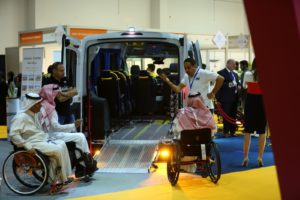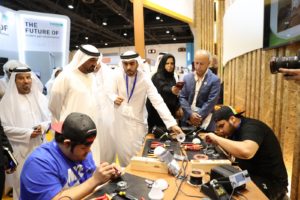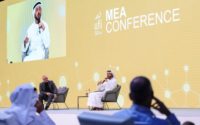AccessAbilities Expo-2019 To Be Riveting With New Innovations And Technology
For the People with Disabilities, a window of opportunity to explore the best and latest innovation and technology that betters their lives is coming again to Dubai next year.
From November 5 to 7, the third edition of AccessAbilities Expo will take place at the Dubai International Convention and Exhibition Centre (DICEC). The three-day event will bring government ministers, policy makers, social workers and officials from across the world on the eagerly-awaited platform.
The Expo is in line with the vision and aspirations of His Highness Sheikh Hamdan bin Mohammed bin Rashid Al Maktoum, Crown Prince of Dubai and Chairman of Dubai Executive Council, to make Dubai the world’s best city for People of Determination by 2020 when it host Expo 2020, the world’s third biggest event after the Olympics and FIFA World Cup that would bring over 20 million visitors to the UAE during its six-month run.
The largest of its kind event in the MENASA region in terms of exhibitor participation and visitors participation, the Expo will offer a dedicated platform to discuss and display trends and technologies for People with Disabilities across various sectors, including aviation, logistics, tourism, hospitality, public transport, education and healthcare, among others.
The Expo will help motivate us to improve their understanding and needs and enhance the services to better meet their needs, integrate them into society and enable them to overcome their daily challenges, remarked His Highness Sheikh Ahmed bin Saeed Al Maktoum, President of Dubai Civil Aviation Authority, Chairman of Dubai Airports and Chairman and Chief Executive of Emirates Airline and Group, who is also the Patron of AccessAbilities Expo.
The Expo is organised by Nadd AlShiba PR and Event Management and Reed Exhibitions. The Expo’s inaugural edition had been a remarkable success with more than 6,000 people attending, along with 150 exhibitors from 41 countries including US, Canada, South Korea, UK, Australia, India, Italy and Czech Republic. They showcased the cutting-edge line up of products and services in this domain. The expo brought the world’s latest robotic and assistive technologies which can assist individuals with disabilities live more independently.
The Expo grew in size and stature with 2017 edition taking place over an area of 8,000 square metres, spread over two halls of DICEC, along with featuring a Knowledge Centre. It had a wider range of interactive activities for the participants and visitors, focused on inclusion and empowerment. More than 40 disability centres and support organisations were represented at the Expo.
The Expo had earlier showcased the world’s first smart eyeglasses that enables people with visual impairment to function without assistance, mobility scooters, Braille smart watch, wheelchair accessible cars, disability driving aids, educational toys, mobility scooters, power chairs, accessible ramps, prosthetics and smart Braille products.
The Expo got strong support from the government bodies including the UAE Ministry of Community Development, Dubai Health Authority (DHA), Dubai Municipality, Roads and Transport Authority (RTA), Dubai Electricity and Water Authority (DEWA), Dubai Police, General Directorate of Residency and Foreigners Affairs (GDRFA-Dubai), Community Development Authority (CDA), Dubai Customs and Dubai Ambulance Services (DCAS).
There are over one billion individuals with disabilities worldwide, of whom 50 million resides in the Middle East. Saudi Arabia, Arab Gulf’s biggest country, has over 700,000 people with disabilities, with over 33 per cent being having physical disabilities.
According to the first-ever World Health Organisation/World Bank report, 15 percent of the global population lives with disabilities, making it the largest minority in the world—with children and women numbering higher among those disabled. The International Labour Organization (ILO) says about 80 per cent of the people with disabilities are of working age, but they face enormous attitudinal, physical and informational barriers to equal opportunities in the world of work. The United Nations High Commissioner for Refugees (UNHCR) says people with disabilities are not a homogenous group – they have different capacities and needs, and contribute in different ways to their communities.








